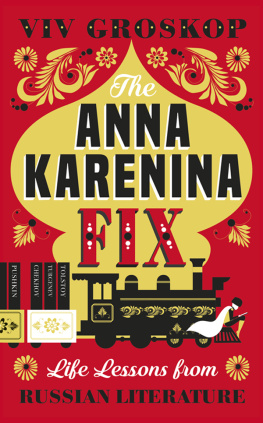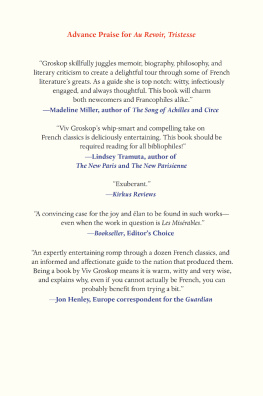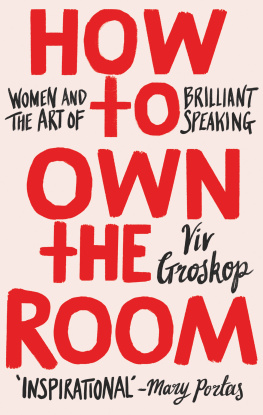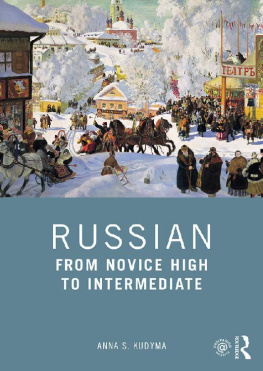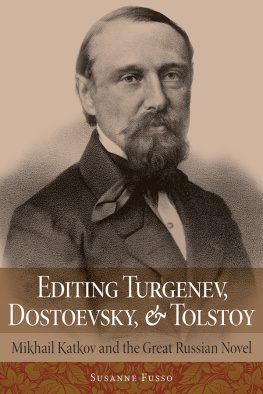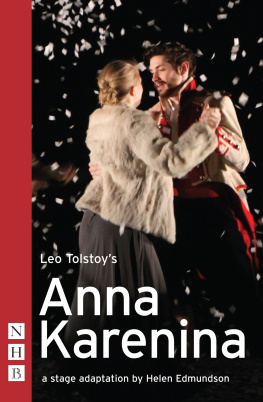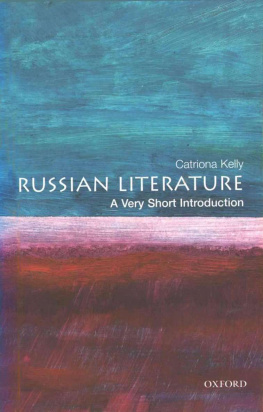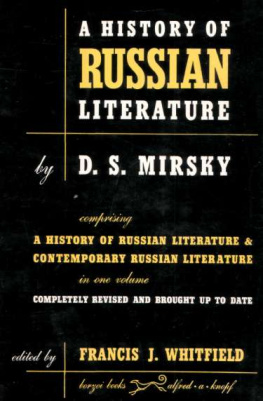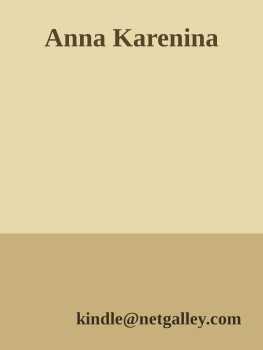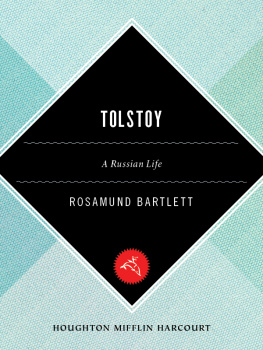Viv Groskop
THE ANNA KARENINA FIX
Life Lessons from Russian Literature
FIG TREE
UK | USA | Canada | Ireland | Australia
India | New Zealand | South Africa
Fig Tree is part of the Penguin Random House group of companies whose addresses can be found at global.penguinrandomhouse.com.
First published 2017
Copyright Viv Groskop, 2017
The moral right of the author has been asserted
Jacket design by gray318
The publisher is grateful for permission to quote from: A Calendar of Wisdom by Leo Tolstoy, translated by Roger Cockrell (Alma Classics, 2015). Reprinted by permission of Alma Books Ltd; Anna Karenina by Leo Tolstoy, translated by Richard Pevear and Larissa Volokhonsky (Penguin Classics, 2000). Translation and editorial copyright Richard Pevear and Larissa Volokhonsky, 2000, reprinted by permission of Penguin Random House; Dr Zhivago by Boris Pasternak, translated by Max Hayward and Manya Harari (Vintage Classics, 2002). English translation copyright Harvill, 1957, reprinted by permission of Penguin Random House; Requiem and The Guest from The Complete Poems of Anna Akhmatova, edited by Roberta Reeder and translated by Judith Hemschemeyer (Canongate, 2000). Reprinted by permission of Canongate Books; Eugene Onegin by Alexander Pushkin, translated by Charles Johnston (Penguin Classics, 2003). Copyright Charles Johnston, 1977, 1979, reprinted by permission of Penguin Random House; Crime and Punishment by Fyodor Dostoevsky, translated by Richard Pevear and Larissa Volokhonsky (Vintage Classics, 1993). Reprinted by permission of Penguin Random House; Three Sisters by Anton Chekhov, translated by Julius West (Digireads, 2008). Reprinted by permission of Digireads.com; One Day in the Life of Ivan Denisovich by Alexander Solzhenitsyn, translated by Ralph Parker (Penguin Modern Classics, 2000). Copyright Victor Gollancz Ltd, 1962, reprinted by permission of Penguin Random House; The Master and Margarita by Mikhail Bulgakov, translated by Michael Glenny (The Harvill Press, 1988). Copyright in the English translation The Harvill Press and Harper and Row Publishers, 1967, reprinted by permission of Penguin Random House; Manuscripts Dont Burn: Mikhail Bulgakov: A Life in Letters and Diaries by J. A. E. Curtis (Bloomsbury, 2012). Reprinted by kind permission of Julie Curtis; Dead Souls by Nikolai Gogol, translated by Robert A. Maguire (Penguin Classics, 2004). Copyright Robert A. Maguire, 2004, reprinted by permission of Penguin Random House; War and Peace by Leo Tolstoy, translated by Anthony Briggs (Penguin Classics, 2007). Translation and editorial material copyright Anthony Briggs, 2005, reprinted by permission of Penguin Random House
Every effort has been made to trace copyright holders and to obtain their permission for the use of copyrighted material. The publisher apologizes for any errors or omissions and would be grateful to be notified of any corrections that should be incorporated in future editions of this book
ISBN: 978-0-241-98126-9
Introduction
I took a speed-reading course and read War and Peace in twenty minutes. It involves Russia.
Woody Allen
An enemy of baked goods of all kinds, Tolstoy was not one of those insufferable people who breeze through life unencumbered by frustration and angst. Comfortingly enough, he was a person who struggled to understand why, at times, life felt intensely painful, even when nothing that bad was happening. His empathy for the pain of the human condition is surprising in some ways, because he lived a monastic existence and indulged in few, if any, pleasures. Unlike the rest of us, he really had very little to feel bad about. Tolstoy was very much not a doughnuts-and-beer kind of guy. He only ate cake if it was a family birthday, and then it had to be a particular cake, his wifes Anke pie, a sour lemon tart named after a family doctor. Mostly, he ate simply and repetitively. One of the researchers at the Tolstoy Museum at his estate in Yasnaya Polyana recently uncovered evidence of his fifteen favourite egg dishes, which he ate in rotation. These included scrambled eggs with dill, and peas with eggs. He didnt drink alcohol. He didnt eat meat. And yet still he frequently felt that he was a terrible person.
Perhaps as a result of this tortured way of thinking, long before self-help manuals became hugely popular in the early twentieth century, Tolstoy had already written one of his own. It was full of the sort of inspirational quotes were now used to seeing on fridge magnets and as advertisements for mindfulness retreats. Some of the sayings are his own quotes:
We only truly come alive in ourselves when we live for others.
If a rich man is to be truly charitable, he will give away all his wealth as soon as possible.
In itself, work is not a virtue, but it is an essential condition of a virtuous life.
The other sayings are from writers and thinkers who inspired him: Rousseau, Plutarch, Pascal, Epictetus, Marcus Aurelius, Emerson, John Ruskin and Henry David Thoreau among others, as well as quotations from the Talmud and the Bible. In Tolstoys defence, A Calendar of Wisdom was deeply serious and well meant. The book itself is calming, fascinating and often unintentionally entertaining: If you are in the grip of carnal passions and overwhelmed by them, you will become entwined in the creeping bindweed of suffering Buddhist wisdom. (Bring on the carnal passions, I say. Worry about the bindweed later.) Also known as A Circle of Readings or The Thoughts of Wise People, A Calendar of Wisdom consisted of a page of inspiring quotes for each day of the year, collected by Tolstoy over sixteen years and a popular edition was published in 1912, two years after his death.
A lot of the quotes directly contradict the messages of todays self-help movement, which encourages us to devote ourselves passionately to the art of learning to love ourselves, or, at the very least, to move away from self-hate. In A Calendar of Wisdom, its the other way round. Pride and a love of the self are wrong; and if we are going to hate anyone, we should hate ourselves. (It literally says this. This sentiment is very typical of Tolstoy, who disliked doing anything pleasant, easy or fun.) Tolstoy prescribes an extreme, ascetic way of life, where lustful desires are especially dangerous and overeating is a sin because it denotes a lack of self-respect. Here are some of his other entries. On 4 June: Because Christianity has become perverted, we now lead a life that has become worse than a pagans. Some of his edicts are painfully enigmatic. On 27 October: The light remains the light, even though a blind man cannot see it. And anything relating to women is generally bad news. On 2 June: A woman has a great responsibility: to give birth. But she doesnt give birth to ideas that is the responsibility of men.
Tolstoy saw these quotes as a guide to life at a time of crisis: a gathering of a circle of the best writers whose ideas would lead to salvation. As Roger Cockrell, translator of the latest edition of the Calendar in English, writes, Tolstoys overall aim is to urge us all to strive, through unrelenting effort, for self-improvement. I am not saying that Tolstoy is Oprah Winfrey with a beard. (Well, I am saying that a bit. And in any case, its just fun to think of the two of them together.) But he had an instinct for the sort of thinking that would become hugely popular a century later. And he had a strong conviction that the only way to fight back against the pressures of modern life was to define the right life lessons and apply them to yourself. This book follows the same impetus and aims to channel the Oprah side of Tolstoy. Its what he would have wanted. Please, no overeating while reading it. Neither Oprah nor Tolstoy would like it.

